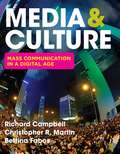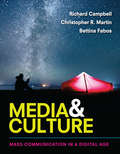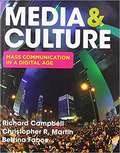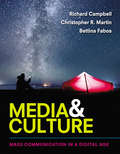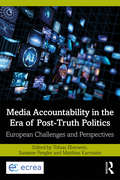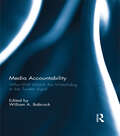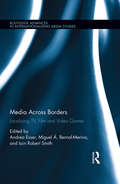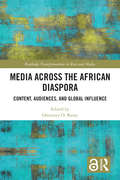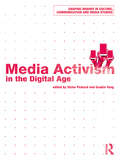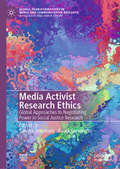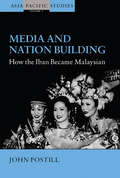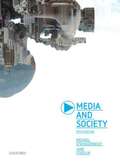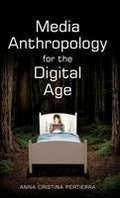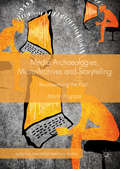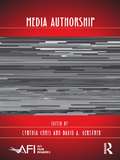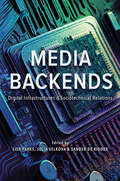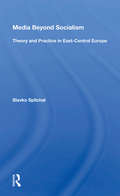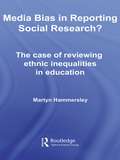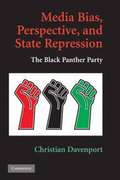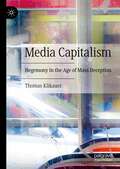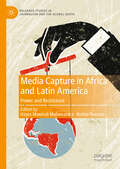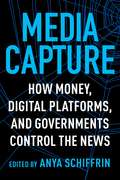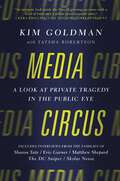- Table View
- List View
Media & Culture: An Introduction To Mass Communication
by Richard Campbell Bettina Fabos Christopher R. MartinWhile we all use digital technology daily, many of us don't realize how text, audio, and visual media converge together to enhance our everyday experiences. <P><P> The new edition of Media & Culture: Mass Communication in a Digital Age enriches students' understanding of these experiences – a skill that has become more important than ever. Media & Culture starts with the digital world students know and then goes further, focusing on what these constant changes mean to them. <P><P>Through new infographics, cross-reference pages, and a digital jobs feature, the book explains and illustrates how the media industries connect, interlock, and converge, Media & Culture brings together industry expertise, media history, and current trends for an engaging, exhilarating look at the media right now.
Media & Culture: An Introduction to Mass Communication
by Richard Campbell Bettina Fabos Christopher R. MartinWhile we all use digital technology daily, many of us don't realize how text, audio, and visual media converge together to enhance our everyday experiences. <P><P>The new edition of Media & Culture: Mass Communication in a Digital Age enriches students' understanding of these experiences - a skill that has become more important than ever. Media & Culture starts with the digital world students know and then goes further, focusing on what these constant changes mean to them. <P><P>Through new infographics, cross-reference pages, and a digital jobs feature, the book explains and illustrates how the media industries connect, interlock, and converge, Media & Culture brings together industry expertise, media history, and current trends for an engaging, exhilarating look at the media right now.
Media & Culture: An Introduction to Mass Communication
by Richard Campbell; Christopher MartinThe current examples, compelling storytelling, and cutting-edge new design also help to keep students engaged. Now, this groundbreaking new edition has been revised from top to bottom making it a better learning tool than ever before.
Media & Culture: Mass Communication in a Digital Age
by Richard Campbell Christopher Martin Bettina FabosWhile we all use digital technology daily, many of us don't realize how text, audio, and visual media converge together to enhance our everyday experiences. The new edition of Media & Culture: Mass Communication in a Digital Age enriches students' understanding of these experiences – a skill that has become more important than ever. Media & Culture starts with the digital world students know and then goes further, focusing on what these constant changes mean to them. Through new infographics, cross-reference pages, and a digital jobs feature, the book explains and illustrates how the media industries connect, interlock, and converge, Media & Culture brings together industry expertise, media history, and current trends for an engaging, exhilarating look at the media right now.
Media & Culture: Mass Communication in a Digital Age (Tenth Edition 2016 Update)
by Richard Campbell Bettina Fabos Christopher R. MartinThe tenth edition of Media & Culture confronts the digital realities of how we consume media--and how students learn in today's classroom. The book shares stories about the history of media, the digital revolution, and ongoing convergence
Media Accountability in the Era of Post-Truth Politics: European Challenges and Perspectives (Routledge Studies in European Communication Research and Education)
by Matthias Karmasin Tobias Eberwein Susanne FenglerBringing together both leading international scholars and emerging academic talent, Media Accountability in the Era of Post-Truth Politics maps the current state of media accountability in Europe and provides fresh perspectives for future developments in media and communication fields. As the integrity of the international media landscape is challenged by far-reaching transformations and the rise of “fake news,” the need for a functional system of media regulation is greater than ever. This book addresses the pressing need to re-evaluate and redefine the notion of accountability in the fast-changing field of journalism and “information provision.” Using comparative research and empirical data, the book’s case studies address the notion of media accountability from various perspectives, considering political and societal change, economic, organisational and technological factors, and the changing role of media audiences. By collecting and juxtaposing these studies, the book provides a new discussion for the old question of how we can safeguard free and responsible media in Europe – a question that seems more urgent than ever. Media Accountability in the Era of Post-Truth Politics is an essential read for students and researchers in journalism, media and communication studies.
Media Accountability: Who Will Watch the Watchdog in the Twitter Age?
by William A. BabcockA small collection of well-honed tools has been employed for some time by media practitioners and the public to help maintain and improve the credibility of journalism and the mass media. These media accountability tools have included ethics codes, media critics, news councils, ombudsmen, journalism reviews and pubic/civic journalism initiatives. Now, in the 21st Century, the mass media are increasingly being buffeted by a perfect storm of declining subscribers and audience share, dwindling advertising revenue, changing corporate demands, unpredictable audiences and new-media competition. If journalism and the mass media are to stay afloat and be credible, the media accountability toolbox needs to contain suitable tools for the job, which begs the question: Who will Watch the Watchdog in the Twitter Age? This book contains answers to this question from the perspective of 17 media ethics experts from around the globe. Their answers will help shape and define for years to come the tools in the media ethics toolbox. This book was originally published as a special issue of the Journal of Mass Media Ethics.
Media Across Borders: Localising TV, Film and Video Games (Routledge Advances in Internationalizing Media Studies)
by Iain Robert Smith Andrea Esser Miguel Á. Bernal-MerinoWhat happened when Sesame Street and Big Brother were adapted for African audiences? Or when video games Final Fantasy and Assassins’ Creed were localized for the Spanish market? Or when Sherlock Holmes was transformed into a talking dog for the Japanese animation Sherlock Hound? Bringing together leading international scholars working on localization in television, film and video games, Media Across Borders is a pioneering study of the myriad ways in which media content is adapted for different markets and across cultural borders. Contributors examine significant localization trends and practices such as: audiovisual translation and transcreation, dubbing and subtitling, international franchising, film remakes, TV format adaptation and video game localization. Drawing together insights from across the audiovisual sector, this volume provides a number of innovative models for interrogating the international flow of media. By paying specific attention to the diverse ways in which cultural products are adapted across markets, this collection offers important new perspectives and theoretical frameworks for studying localization processes in the audiovisual sector. For further resources, please see the Media Across Borders group website (www.mediaacrossborders.com), which hosts a ‘localization’bibliography; links to relevant companies, institutions and publications, as well as conference papers and workshop summaries.
Media Across the African Diaspora: Content, Audiences, and Influence (Routledge Transformations in Race and Media)
by Omotayo O. BanjoThis volume gathers scholarship from varying disciplinary perspectives to explore media owned or created by members of the African diaspora, examine its relationship with diasporic audiences, and consider its impact on mainstream culture in general. Contributors highlight creations and contributions of people of the African diaspora, the interconnections of Black American and African-centered media, and the experiences of audiences and users across the African diaspora, positioning members of the Black and African Diaspora as subjects of their own narratives, active participants and creators. In so doing, this volume addresses issues of identity, culture, audiences, and global influence.
Media Activism in the Digital Age
by Guobin Yang Victor PickardMedia Activism in the Digital Age captures an exciting moment in the evolution of media activism studies and offers an invaluable guide to this vibrant and evolving field of research. Victor Pickard and Guobin Yang have assembled essays by leading scholars and activists to provide case studies of feminist, technological, and political interventions during different historical periods and at local, national, and global levels. Looking at the underlying theories, histories, politics, ideologies, tactics, strategies, and aesthetics, the book takes an expansive view of media activism. It explores how varieties of activism are mediated through communication technologies, how activists deploy strategies for changing the structures of media systems, and how governments and corporations seek to police media activism. From memes to zines, hacktivism to artivism, this volume considers activist practices involving both older kinds of media and newer digital, social, and network-based forms. Media Activism in the Digital Age provides a useful cross-section of this growing field for both students and researchers.
Media Activist Research Ethics: Global Approaches to Negotiating Power in Social Justice Research (Global Transformations in Media and Communication Research - A Palgrave and IAMCR Series)
by Sandra Jeppesen Paola SartorettoThis book maps complex ethical dilemmas in social justice research practices in media and communication. Contributors critically analyse power dynamics that arise when building equitable research relations with media activists, social movements, and cultural producers, considering issues of access, control, affective labour, reciprocal critiques, and movement pedagogies. Authors probe the ethical challenges faced when horizontal relations inadvertently create conflicts leading to oppressive communication; when affective demands generate non-reciprocal relations of care; and when participant anonymity has to be balanced with self-expression and voice. Chapters explore engagements with digital technologies in developing research relations, covering new research practices from horizontal collectives to dialogical auto-ethnography; from community scholarship and pedagogies to decolonising research. The book asks researchers to consider the complexities of ethical practices today in socially engaged global research within the neoliberal university.
Media And Nation Building
by John PostillWith the end of the Cold War and the proliferation of civil wars and "regime changes," the question of nation building has acquired great practical and theoretical urgency. From Eastern Europe to East Timor, Afghanistan and recently Iraq, the United States and its allies have often been accused of shirking their nation-building responsibilities as their attention -- and that of the media -- turned to yet another regional crisis. While much has been written about the growing influence of television and the Internet on modern warfare, little is known about the relationship between media and nation building. This book explores, for the first time, this relationship by means of a paradigmatic case of successful nation building: Malaysia. Based on extended fieldwork and historical research, the author follows the diffusion, adoption, and social uses of media among the Iban of Sarawak, in Malaysian Borneo and demonstrates the wide-ranging process of nation building that has accompanied the Iban adoption of radio, clocks, print media, and television. In less than four decades, Iban longhouses ('villages under one roof') have become media organizations shaped by the official ideology of Malaysia, a country hastily formed in 1963 by conjoining four disparate territories.
Media And Society, 5th ed
by Michael O'Shaughnessy Jane StadlerMedia and Society examines the role of the media in contemporary society and analyses representations of the world found in advertisements, film, television, photographs and language. It clearly presents theoretical approaches and includes many examples, definitions, issues questions and explanations to aid students' understanding.
Media Anthropology for the Digital Age
by Anna PertierraThe field of anthropology took a long time to discover the significance of media in modern culture. In this important new book, Anna Pertierra tells the story of how a field - once firmly associated with the study of esoteric cultures - became a central part of the global study of media and communication. She recounts the rise of anthropological studies of media, the discovery of digital cultures, and the embrace of ethnographic methods by media scholars around the world. Bringing together longstanding debates in sociocultural anthropology with recent innovations in digital cultural research, this book explains how anthropology fits into the story and study of media in the contemporary world. It charts the mutual disinterest and subsequent love affair that has taken place between the fields of anthropology and media studies in order to understand how and why such a transformation has taken place. Moreover, the book shows how the theories and methods of anthropology offer valuable ways to study media from a ground-level perspective and to understand the human experience of media in the digital age. <p><p> Media Anthropology for the Digital Age will be of interest to students and scholars of media and communication, anthropology, and cultural studies, as well as anyone wanting to understand the use of anthropology across wider cultural debates.
Media Archaeologies, Micro-Archives and Storytelling
by Martin PogačarThis book argues that today we live in the culture of the past that delimits our world and configures our potentialities. It explores how the past invades our presents and investigates the affective uses of the past in the increasingly elusive present. Remembering and forgetting are part of everyday life, popular culture, politics, ideologies and mythologies. In the time of the ubiquitous digital media, the ways individuals and collectivities re-presence their pasts and how they think about the present and the future have undergone significant changes. The book focuses on affective micro-archives of the memories of the socialist Yugoslavia and investigates their construction as part of the media archaeological practices. The author further argues that these affective practices present a way to reassemble the historical and relegitimize individual biographies which disintegrated along with the country in 1991.
Media Authorship (AFI Film Readers)
by David A. Gerstner Cynthia ChrisContemporary media authorship is frequently collaborative, participatory, non-site specific, or quite simply goes unrecognized. In this volume, media and film scholars explore the theoretical debates around authorship, intention, and identity within the rapidly transforming and globalized culture industry of new media. Defining media broadly, across a range of creative artifacts and production cultures—from visual arts to videogames, from textiles to television—contributors consider authoring practices of artists, designers, do-it-yourselfers, media professionals, scholars, and others. Specifically, they ask: What constitutes "media" and "authorship" in a technologically converged, globally conglomerated, multiplatform environment for the production and distribution of content? What can we learn from cinematic and literary models of authorship—and critiques of those models—with regard to authorship not only in television and recorded music, but also interactive media such as videogames and the Internet? How do we conceive of authorship through practices in which users generate content collaboratively or via appropriation? What institutional prerogatives and legal debates around intellectual property rights, fair use, and copyright bear on concepts of authorship in "new media"? By addressing these issues, Media Authorship demonstrates that the concept of authorship as formulated in literary and film studies is reinvigorated, contested, remade—even, reauthored—by new practices in the digital media environment.
Media Backends: Digital Infrastructures and Sociotechnical Relations (Geopolitics of Information)
by Jonathan Cohn Vicki Mayer Ranjit Singh Mark Andrejevic Lisa Parks Zala Volcic Amanda Lagerkvist Anne Kaun Tim Markham Kaarina Nikunen Stine Lomborg Rahul Mukherjee Vibodh Parthasarathi Philippe Bouquillion Jacek Smolicki Fredrik Stiernstedt Christine Ithurbide Faithe Day Sander De Ridder Fatima Gaw Alexis Logsdon Philipp Seuferling Matilda Tudor Julia VelkovaExploring how we make, distribute, and consume today’s media systems Media backends--the electronics, labor, and operations behind our screens--significantly influence our understanding of the sociotechnical relations, economies, and operations of media. Lisa Parks, Julia Velkova, and Sander De Ridder assemble essays that delve into the evolving politics of the media infrastructural landscape. Throughout, the contributors draw on feminist, queer, and intersectional criticism to engage with infrastructural and industrial issues. This focus reflects a concern about the systemic inequalities that emerge when tech companies and designers fail to address workplace discrimination and algorithmic violence and exclusions. Moving from smart phones to smart dust, the essayists examine topics like artificial intelligence, human-machine communication, and links between digital infrastructures and public service media alongside investigations into the algorithmic backends at Netflix and Spotify, Google’s hyperscale data centers, and video-on-demand services in India. A fascinating foray into an expanding landscape of media studies, Media Backends illuminates the behind-the-screen processes influencing our digital lives. Contributors: Mark Andrejevic, Philippe Bouquillion, Jonathan Cohn, Faithe J. Day, Sander De Ridder, Fatima Gaw, Christine Ithurbide, Anne Kaun, Amanda Lagerkvist, Alexis Logsdon, Stine Lomborg, Tim Markham, Vicki Mayer, Rahul Mukherjee, Kaarina Nikunen, Lisa Parks, Vibodh Parthasarathi, Philipp Seuferling, Ranjit Singh, Jacek Smolicki, Fredrik Stiernstedt, Matilda Tudor, Julia Velkova, and Zala Volcic
Media Beyond Socialism: Theory And Practice In East-Central Europe
by Slavko SplichalMedia Beyond Socialism treats the changing relationships among media, state, economy, and civil society in the current period of transition in East Europe from socialism to the establishment of Western-type democracies. Analyzing the relevance of mass communication and particularly of the media in the democratization process, the book addresses suc
Media Bias in Reporting Social Research?: The Case of Reviewing Ethnic Inequalities in Education (Routledge Advances in Sociology #Vol. 23)
by Martyn HammersleyIn recent years, the importance of disseminating the findings of social research has been given increased emphasis. The most effective way in which this can be done is via the mass media. However, there are frequent complaints that media coverage of social and educational research is very limited and often distorted. Through a detailed analysis of a particular case about ethnic inequalities in educational achievement, this book examines some of the processes involved in the reporting of research findings, and their implications for judgements about media distortion and bias. This volume is relevant to many fields, including education, media studies, cultural studies, sociology and social policy.
Media Bias, Perspective, and State Repression: The Black Panther Party
by Christian DavenportThis book examines information reported within the media regarding the interaction between the Black Panther Party and government agents in the Bay Area of California (1967-1973). Christian Davenport argues that the geographic locale and political orientation of the newspaper influences how specific details are reported, including who starts and ends the conflict, who the Black Panthers target (government or non-government actors), and which part of the government responds (the police or court). Specifically, proximate and government-oriented sources provide one assessment of events, whereas proximate and dissident-oriented sources have another; both converge on specific aspects of the conflict. The methodological implications of the study are clear; Davenport's findings prove that in order to understand contentious events, it is crucial to understand who collects or distributes the information in order to comprehend who reportedly does what to whom as well as why.
Media Capitalism: Hegemony in the Age of Mass Deception
by Thomas KlikauerThis book argues that media and capitalism no longer exist as separated entities, and posits three reasons why one can no longer exist without the other. Firstly, mass media have become indispensable to capitalism due to the media’s ability to sell the commodities of mass consumerism. Media capitalism also creates pro-capital attitudes among a target population and establishes an ideological hegemony. Thirdly, media capitalism provides mass deception to hide the pathologies of capitalism, which include mass poverty, rising inequalities, and the acceleration of global warming. To illuminate this, the book’s historical chapter traces the emergence of media capitalism. Its subsequent chapters show how media capitalism has infiltrated the public sphere, society, schools, universities, the world of work and finally, democracy. The book concludes by outlining how societies can transition from media capitalism to a post-media- capitalist society.
Media Capture in Africa and Latin America: Power and Resistance (Palgrave Studies in Journalism and the Global South)
by Hayes Mawindi Mabweazara Bethia PearsonHow can current debates on ‘media capture’ be understood within the contexts of Africa and Latin America? This edited collection provides a nuanced exploration of media capture—a critical yet contested concept that examines and illuminates how media can become skewed in favour of power—while also highlighting spaces and strategies of resistance. By adopting a South-South perspective, it brings together scholars focused on these issues in both regions, featuring a dialogue between two leading scholars, Herman Wasserman and Silvio Waisbord in the Foreword. The book not only demonstrates how media practices in Africa and Latin America are influenced by the political economy of their media systems, but also contributes significantly to advancing empirical, theoretical, and comparative research on media in non-Western settings.
Media Capture: How Money, Digital Platforms, and Governments Control the News
by Edited by Anya SchiffrinWho controls the media today? There are many media systems across the globe that claim to be free yet whose independence has been eroded. As demagogues rise, independent voices have been squeezed out. Corporate-owned media companies that act in the service of power increasingly exercise soft censorship. Tech giants such as Facebook and Google have dramatically changed how people access information, with consequences that are only beginning to be felt.This book features pathbreaking analysis from journalists and academics of the changing nature and peril of media capture—how formerly independent institutions fall under the sway of governments, plutocrats, and corporations. Contributors including Emily Bell, Felix Salmon, Joshua Marshall, Joel Simon, and Nikki Usher analyze diverse cases of media capture worldwide—from the United Kingdom to Turkey to India and beyond—many drawn from firsthand experience. They examine the role played by new media companies and funders, showing how the confluence of the growth of big tech and falling revenues for legacy media has led to new forms of control. Contributions also shed light on how the rise of right-wing populists has catalyzed the crisis of global media. They also chart a way forward, exploring the growing need for a policy response and sustainable models for public-interest investigative journalism. Providing valuable insight into today’s urgent threats to media independence, Media Capture is essential reading for anyone concerned with defending press freedom in the digital age.
Media Circus: A Look at Private Tragedy in the Public Eye
by Kim Goldman Tatsha RobertsonImagine losing a loved one in the public eye. A media frenzy ensues and spreads your family name through the news. Reporters ambush you, and across the country, strangers gossip about your personal loss. Welcome to the circus. No one understands better than Kim Goldman the complex emotions of individuals suffering a personal tragedy under the relentless gaze of the media. During the famed O.J. Simpson trial, Kim, whose brother, Ron Goldman, was brutally murdered, became the public poster child for victims suffering in the public eye. In Media Circus, Goldman, now a dedicated victims' advocate who works with families across the country, presents the first collective look at these ordinary, grieving victims—forced to manage their very private trauma and despair in a very public way. Through candid interviews and detailed, original reporting, Media Circus delivers riveting, humanizing, and inspiring stories from the victims and survivors of violent crimes who found themselves the focus of national media attention. Its heartfelt narratives showcase the unique challenges of coping with and healing from grief when the whole world is watching. In these pages, the families of other victims tell their stories, including: Esaw And Emerald Garner, wife and daughter of police brutality victim Eric Garner (2014) Scarlett Lewis, mother of six-year-old Newtown tragedy victim Jesse Lewis (2012) Debra Tate, sister of Charles Manson murder victim Sharon Tate (1969) Judy Shepard, mother of gay hate-crime victim Matthew Shepard (1998) Mildred Muhammad, ex-wife of the DC Sniper (2002) Tere Duperrault Fassbender, survivor of family's brutal murder at sea (1961) Collene Campbell, sister of murdered NASCAR driver Mickey Thompson (1988) Marie Monville, wife of the Amish Shooter (2006) Dave And Mary Neese, parents of teen murder victim Skylar Neese (2012) Scott And Kathleen Larimer, parents of Aurora theater shooting victim John Larimer, and Shirley Wygal, mother of Aurora theater shooting victim Rebecca Wingo (2012) Media Circus goes beyond the names and faces to show the real victims behind the stories.
Media Commercialization and Authoritarian Rule in China
by Daniela StockmannIn most liberal democracies commercialized media is taken for granted, but in many authoritarian regimes the introduction of market forces in the media represents a radical break from the past with uncertain political and social implications. In Media Commercialization and Authoritarian Rule in China, Daniela Stockmann argues that the consequences of media marketization depend on the institutional design of the state. In one-party regimes such as China, market-based media promote regime stability rather than destabilizing authoritarianism or bringing about democracy. By analyzing the Chinese media, Stockmann ties trends of market liberalism in China to other authoritarian regimes in the Middle East, North Africa, sub-Saharan Africa, and the post-Soviet region. Drawing on in-depth interviews with Chinese journalists and propaganda officials as well as more than 2,000 newspaper articles, experiments, and public opinion data sets, this book links censorship among journalists with patterns of media consumption and media's effects on public opinion.
